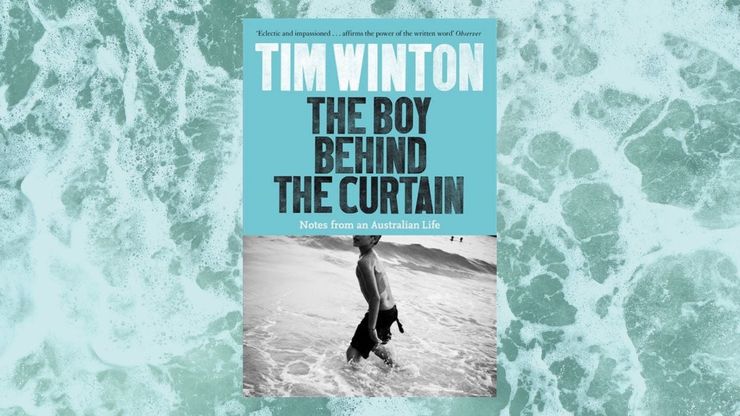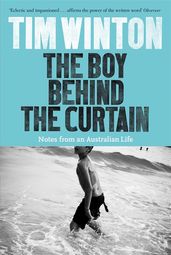Read 'Betsy' from Tim Winton's The Boy Behind the Curtain
Read an extract from The Boy Behind the Curtain, the new autobiographical short story collection from Tim Winton.

Following on from his memoirs Land's Edge and Island Home, in The Boy Behind the CurtainTim Winton shares more true stories from his life and childhood in Western Australia. Read on for the story of Betsy, his family's much-loathed 1954 Hillman Minx.
Betsy
My dad's father was the only one of my four grandparents who ever drove a motor vehicle. Les Winton was a pastry chef and shopkeeper and his chief mode of transport was the '35 flatbed Chev he used for deliveries. But he was also a muso and paterfamilias and for his off-work activities he favoured the Harley. The ancient bike had a sidecar the size of a zeppelin's gondola and could accommodate his band and instruments or his family and camping gear, including firearms and tackle. As a kid I loved to hear stories of him riding home from a gig at the Blue Room while his ventriloquist dummy rode shotgun, gums flapping in the wind, beside him. For a few years after the war he sported a Depression-era Rugby tourer whose side curtains were X-rayssalvaged from the repat hospital around the corner – a vehicle worthy of his vaudevillian spirit.
So I never understood why he purchased the dour little sedan he called Betsy, for it was an inexplicable departure. It was as if he'd suddenly surrendered to convention. Perhaps this was the point at which he realized it was time to put away the nose flute and give up his shadow life as an entertainer, because a conveyance more dowdy than the 1954 Hillman Minx could hardly be imagined. By the time I knew Pop most of his japes and jalopies were the stuff of myth. The only thing ever I saw him drive was Betsy. Heavy of haunch and whiffy at close quarters, that car was an aesthetic travesty and an offence to youth, but she was a family fixture, like an embarrassing relative who lingered dismally and could never be quietly seen off.
The Hillman was a dumpy colonial sedan of unmistakably English provenance, a testament to modesty and low expectations. Its duco was cardigan grey. Introducing a later model in 1955, the manufacturer crowed about the two-tone paint job called ‘the gay look', but Pop seems to have spurned this zany innovation and resigned himself to the sobriety of the model at hand. On a good day the interior smelt like an abandoned cinema. The bodywork was bulbous and cumbersome. Under the hood, like a cowering cockroach, lay a tiny 1300 cc engine. At the other end a lofty back seat afforded passengers an excellent view of the driver's balding pate, a glimpse of the gunmetal bonnet and little else. To port and starboard there were toy-like signal arms with which to semaphore turning intentions. These last accessories should have been charming. Now, of course, I smile at the memory, but back then they were badges of family shame.
I always dreaded being seen in the Minx. Slotted into her low asbestos shelter behind the chookhouse, Betsy was beautifully camouflaged – grey on grey, quite hard to see, which was just howI liked her – but on the streets of Perth she felt all too visible. And Pop's antic driving didn't help. On the road, as in religion, he was a trenchant nonconformist, and being his passenger certainly kept you protestant and prayerful. Was I the only kid to wince in recognition when Mr. Magoo came on the telly?
Old people were bores and obstacles. I didn't see the point of them, and so I prided myself on my forbearance. Some dull Sunday afternoons, if I were feeling righteously indulgent, I could work up a spasm of interest in oldish things. Behind Nan and Pop's shop, for example, there were many ancient marvels: prehistoric tools and weapons, prostheses, musical instruments. You could encounter these in private. You weren't required to sport them in public, so they couldn't trap you and define you. Which is not to say that every old car was a threat to one's reputation, but in matters of carriage a fellow needed to be discerning and I knew style when I saw it. My cousins from Margaret River had a '38 Ford Coupe called Henry that exuded gangster swank even as it squeaked and belched along a dirt road. Uncle Bill in bogan Carlisle had a '59 Chev Bel Air the size of an aircraft carrier, surely the most glamorous vehicle to ever grace the bitumen – not even the Batmobile could shade it. I'd learnt a few things about cars by then, many of them through a gap in the fence at home. The sociopath next door had a grease pit in his garage and a street rod that he and his mates liked to work on day and night. That jalopy was chopped, pinched, ported and polished. Some evenings it sounded like Satan clearing his throat. Even though my parents were unimpressed I thought his hot rod was deadly. It later transpired that he was too, but that's another story.
The point is, I understood old cars were not to be dismissed out of hand. Driven the right way, some could be cool. Within a few years, it'd be nothing to see a beaded hippie at the wheel of a '55 Wolseley or a punk moll lurching from a '59 Anglia. But I knewPop's Hillman would never be cool. To this day no beardy hipster will go there, for even irony has frontiers. The tragically misnamed Minx would never outlive her homeliness. I didn't just hate riding in her, I was offended by her very existence.
You'd be drawing a long bow in trying to give Betsy a pass on the grounds of eccentricity. I was conversant with oddness – after all I was a Winton. My nan had a certain local reputation. She lived in a tent in the backyard while Pop shared the bedroom with the kids and the in-laws. She tied 20 yards of twine to Pop's big toe so she could be alerted to developments indoors. All he had to do was yank on the string and his crash cymbal would shimmy cacophonously along the path. I guess you can't run a family and a business without a communications system. Every Sunday as we left their place after the ritual visit, Nan stood in the street and waved us off with a long and jaunty waggle of her right leg. Always and without fail – it was her signature move. Knee stockings and all. The neighbours were inured to it. To my mind such behaviour was unusual, but not actually disgraceful. Owning a car like Betsy, though – that was crossing the line. It put a dent in the family's honour.
The Minx was no kitten when Pop bought her but she managed to outlast him. Once he was in his seventies even a carriage as sedate as Betsy was too much car for him to manage. For a while she brooded undriven in her asbestos hutch, and not long afterwards Nan and Pop were forced to give up the shop and ‘go into care'. That was a sad day. But there was worse news to come. Nan and Pop thought Betsy should move in with us.
Such were the giddy means by which we became a two-car family. Dad drove the Minx to work and left the Falcon at home with Mum. When we moved to Albany and I began high school, he insisted on driving me, even though I could see the grounds from the front verandah. He thought a lift in the mornings might steady my nerves in the first few weeks. Which was kind, I know,but the gesture was wasted on me. I spent those brief trips finding new ways to slide so low in the passenger seat as to become invisible. I didn't know a soul in town but I was still making sure no one would recognize me. As the old man hoisted the natty indicatorarm and set sail for school at a pace that was plausibly nautical, I'd press my lower back against the seat springs and take a passionate interest in the inner seams of my bag. As if the choice of ride weren't shame enough, Dad always expected a kiss goodbye at the school gate. This was delivered in-car at great speed and very low altitude.
Eventually I broke free of the morning delivery. I did everything in my power to distance myself from the Minx. When I finally made friends and brought them home I denied all connection to the portly conveyance in the drive. Months later, when my mates took to squatting in the front yard to howl at their distorted reflections in Betsy's double-D hubcaps, I was still huffing and bluffing, but no one bought my excuses. That car was a perpetual laugh at my expense. I feared it would do me permanent damage.
Unlike most country boys, I wasn't anxious to get my driver's licence. For one thing, I had ghastly forebodings about having to learn in Betsy. While other kids kangaroo-hopped their mums' Datsuns and dads' farm utes up the main street, I'd be trundling along in something that looked like a slow-combustion stove. I was in no hurry to experience that.
I wasn't alone in my antipathy to Betsy. It was a rare patch of common ground between my younger siblings and me; we mounted a years-long campaign to convince Dad to put her out to pasture. I suggested we take her to a friend's farm and give her a real Sam Peckinpah send-off: expend a couple of boxes of shotgun shells, maybe a Molotov cocktail if it wasn't fire season. But Dad said Betsy was no trouble. In all these years he hadn't had to spend a cent on her. No, it'd be a waste to let the Minx go. At the mere mention of her name a dreamy smile came to his face. I don't think he had anyspecial affection for the old bus – he'd come to enjoy the discomfort she produced in us, the goad to our youthful vanity. And it was true that car kicked on: you just turned the key, pressed the old-timey starter button and she sputtered to life.
My last vivid memory of Betsy is of the day we moved back to the city after three years of exile. Before we left town we had a rare nosh-up at a Chinese joint. Then we hit the road, Mum and my sister and baby brother in the Falcon, my other brother and I hostages as much as passengers in the dreaded Minx. The day was brutally hot. It was a five-hour trip in a decent car, but in Betsy you could add another hour. The harvested paddocks either side of the highway were brown. We were shirtless. Dad wore his signature singlet, a saggy old thing whose days of whiteness were but a memory. The wind through the open windows was dry and fleecy and as the seats heated up beneath us they released the stench of church halls, courthouses, railway waiting-rooms: odours of weariness, boredom and advanced age.
From boyhood I had known my father to be a man of kindly nature but irritable bowel. And for him, Chinese was not ideal road fodder. So it was no surprise when, about three hours into the journey, he pulled over, snatched a handful of tissues from the glove box and vaulted across a farm fence for the shelter of some piled logs. Accustomed to this sort of behaviour, my brother and I sat in our customary bovine silence as the engine ticked and the pong of old people rose from the upholstery. Eventually our father returned at a jog, trailing a comet-tail of flies, tucking the singlet back into his shorts as he came. He got in, turned the key, pressed the endlessly embarrassing starter button and off we went, at 36 miles per hour. Which may have been quite a clip in the days of Menzies, but not so impressive to a teenager in 1975. It certainly wasn't enough to blow the flies clear of the cabin.
A few metres down the road I caught a whiff of somethingvile. Worse than old people, this was the smell of death. It seemed that four hundred flies were onto something. I tried to bring this to Dad's attention but, like his gaze, his mind was fixed firmly on the road. The stink got worse. My brother began to whinge, but the old man wasn't having any of it. Once he was on the bitumen he was hard to stop. He drove on with the baking wind in his face, squinting through the blowflies, noticing nothing, conceding less, until my brother began to gag. Even then Dad smelt nothing, but the prospect of a puker had him standing on the brakes. He reefed Betsy to the road's edge, and given the stiffness of the suspension and the trolley-like steering, it was a manoeuvre as jerky and spedup as a scene from an Ealing comedy.
The moment Dad got out the offending stench went with him. Which seemed significant. A rapid examination of his person – conducted, of course, in full view of the rural motoring public – established the unpalatable facts, the finer details of which needn't be gone into here. Suffice it to say that in the event of an unscheduled roadside comfort stop, a long and saggy singlet is not helpful attire. Dad had brought a stowaway aboard. It will surprise nobody to learn that with a shortage of water and no more tissues available the remainder of the trip was a test of character for all.
To this day my father refuses to attribute the disappearance of the 1954 Hillman Minx to this little misadventure. But I believe that after it he saw Betsy in a different light. The rest of us had always associated that car with foulness, ridicule and lingering shame, and it was as if the scales had finally fallen from his eyes – or perhaps his nose. While he denies this, the vagueness with which he speaks of Betsy's retirement is telling. Neither he nor any other member of our family can fix a date to her demise or the circumstances under which she left our employ. She certainly didn't get the paddock shoot-up I'd dreamt of. For all her sturdiness, her grey, implacable utility, she faded away without valediction. Her replacement,a pinky-brown '59 Austin Lancer, was no filly either but at least, as everyone agreed, she had some poke. Betsy had been supplanted by a frisky cousin, a dame with colour left in her cheeks, and daggy as she seemed, the Austin was a bit of a giggle. Old, yes, but not socially catastrophic.
Still and all, even if in her dullness Betsy epitomized the Menzian era whence she sprang, she saw out the Malayan Emergency, the Vietnam War, the space race and the Whitlam revolution. In our time of instant obsolescence, her endurance is sobering, and as I age I wonder if perhaps I was a little hasty to spurn her. We're such merciless judges in our youth. And she'd be a vintage ride now. But I have to admit that if I came upon her tomorrow, abandoned in a cow paddock, I'd set fire to her in a heartbeat. Provided, of course, it wasn't fire season.
The Boy Behind the Curtain
by Tim Winton
In this deeply personal collection of true stories and essays Tim Winton shows how moments from his childhood and life growing up have shaped his views on class, faith, fundamentalism, the environment, and – most pressingly – how all his experiences have made him a writer.
From unexpected links between car crashes and faith, surfing and writing, to the story of his upbringing in the changing Australian landscape, The Boy Behind the Curtain is an impassioned, funny, joyous, astonishing collection of memories, and Winton's most personal book to date.



